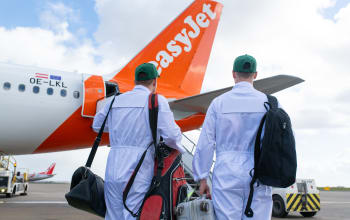LEEDS BRADFORD AIRPORT EXPANDS AIRSIDE EV FLEET
Share this article

Leeds Bradford Airport (LBA) has reached another milestone in its roadmap to Net Zero by fully electrifying its first operational department, its engineering team.
The Engineering team at LBA carry out essential maintenance and repairs on a number of crucial airport systems and has recently introduced a fleet of seven brand-new electric vehicles (EVs) hitting a landmark achievement for Yorkshire’s only airport and taking the total fleet to 12.
Transitioning traditional diesel vehicles to EVs is a small but crucial step towards achieving the airport’s net zero target by 2030.
Electric vehicles are counted as Scope 2 emissions, while emissions from vehicles that use fuel are counted as Scope 1 emissions. By working to reduce emissions across both, LBA is taking positive action to support its net zero target.
Joselyn Rankin, Head of Corporate Affairs and Sustainability comments: “Emissions we own and control are known as Scope 1 and Scope 2 emissions. This includes all of the carbon emissions for which we are directly responsible and in full control of. For example, our own energy use, heating and cooling and company vehicles. It’s for this reason, that our carbon roadmap focusses on our own emissions as a priority.
“On average, Scope 3 emissions typically represent over 90% of a company's total emissions. We, along with the other airports, are more than aware that the majority of our emissions are produced by our on-site business partners, which includes our airline partners. This is not something we are shying away from. We’re committed to putting measures in place to encourage and make it easier for our partners to decarbonise their own operations and have been having productive conversations across our estate to enable this.
"At LBA, we want to ensure we are doing everything we can to reach net zero by 2030 across Scope 1 and 2 as we promised in 2018.”
LBA has also recently launched a 2,000-litre hydro-treated vegetable oil (HVO) trial for a selection of its heavier airside vehicles, including passenger transfer buses. The HVO replaces traditional diesel in the vehicles resulting in a carbon saving of up to 90%.
HVO is a biofuel made by the hydrocracking or hydrogenation of vegetable oil. The resulting fuel offer reduced emissions, improved air quality and is classed as a renewable fuel. It also has an improved performance in colder weather, better engine performance and fuel efficiency.




